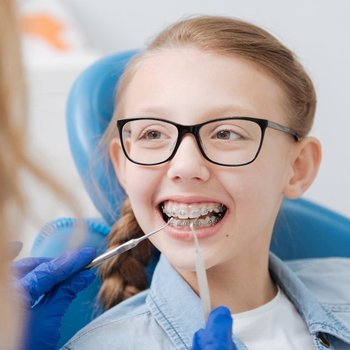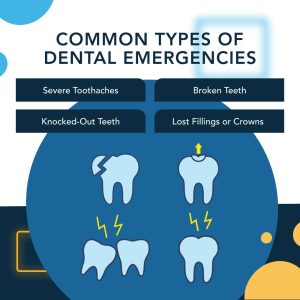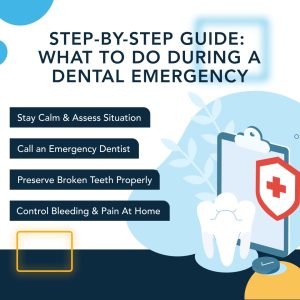Dental emergencies can be painful, frightening, and confusing, especially if they happen unexpectedly. Whether it’s a sudden toothache, a chipped tooth, or a knocked-out tooth from an accident, knowing how to respond can make a significant difference in protecting your oral health. In this guide, we’ll walk you through what qualifies as a dental emergency, common types you might encounter, and how to handle each one effectively until you can see a dentist.
What Counts as a Dental Emergency?
Not every dental issue requires immediate treatment, but some situations demand urgent attention to prevent permanent damage or serious infection. A dental emergency typically involves severe pain, bleeding, swelling, or trauma to the teeth or gums. These cases often require same-day care from an emergency dentist and shouldn’t be delayed.
Common Types of Dental Emergencies
Dental emergencies come in many forms. While some are due to accidents or injuries, others may stem from untreated dental conditions that suddenly escalate. Below are some of the most common types of dental emergencies and what you need to know about each.
Severe Toothaches
A toothache that doesn’t go away, or worsens over time, can signal a serious underlying issue like decay, an exposed nerve, or infection. If the pain is sharp, throbbing, or radiates to the jaw or ear, it’s important to see an emergency dentist right away. Avoid applying aspirin directly to the gums, as this can cause chemical burns. Instead, rinse with warm salt water and use a cold compress to reduce swelling until you can get professional care.
Cracked or Broken Teeth
Teeth can crack or break due to trauma, grinding, or biting something hard. Depending on the severity, this may expose nerves and lead to intense pain or sensitivity. If you’ve chipped or fractured a tooth, rinse your mouth with warm water and save any fragments if possible. Use a cold compress to minimize swelling, and avoid chewing on that side of your mouth. Prompt treatment is key to saving the tooth and preventing infection.
Knocked-Out (Avulsed) Teeth
A knocked-out tooth is one of the most urgent dental emergencies. If treated within 30 to 60 minutes, there’s a strong chance the tooth can be saved. Handle the tooth by the crown (not the root), gently rinse it without scrubbing, and try to place it back into the socket. If that’s not possible, store it in a container of milk or saline and get to an emergency dentist in Broward County immediately. Time is critical in this situation.
Lost Fillings or Crowns
Losing a filling or crown may not seem urgent, but it can leave the tooth exposed to bacteria and sensitive to temperature or pressure. While waiting to see your dentist, you can temporarily cover the area with dental cement (available at most drugstores). Avoid chewing on that side and keep the area clean. Timely replacement is necessary to avoid further decay or damage.
Abscesses or Oral Infections
A dental abscess is a pocket of pus caused by a bacterial infection and is a serious condition that can spread to other parts of the body if left untreated. Symptoms include severe pain, swelling, fever, a bad taste in your mouth, or a small bump on the gum. These infections often originate from untreated cavities, gum disease, or trauma. Immediate care is crucial. Do not try to drain the abscess yourself.
Soft Tissue Injuries (Gums, Lips, Cheeks, Tongue)
Injuries to the soft tissues in your mouth can result from falls, sports accidents, or biting down improperly. If you’re bleeding, gently clean the area with water and apply pressure using a clean gauze or cloth. Use a cold compress to reduce swelling. If bleeding doesn’t stop within 10–15 minutes, or the cut is deep, visit an emergency dentist or urgent care center for evaluation and stitches if needed.
Signs You Need Immediate Dental Care
It’s not always easy to tell when a dental issue becomes an emergency. While some discomfort can wait for a routine appointment, certain symptoms should never be ignored. These signs often indicate infection, trauma, or other serious conditions that require prompt attention to avoid long-term damage or complications. If you experience any of the following symptoms, contact an emergency dentist near you immediately:
Persistent Bleeding
Bleeding that continues for more than 15 minutes, especially after an injury, tooth extraction, or trauma to the mouth, is a red flag. This could point to damaged blood vessels, deep tissue injury, or a clotting issue. In this situation, you should apply gentle pressure with clean gauze and seek emergency care. Uncontrolled bleeding needs professional evaluation and treatment.
Intense, Unrelenting Pain
Pain that doesn’t subside with over-the-counter medication or worsens with time may signal an infection or nerve involvement. This is especially concerning if it’s sharp, throbbing, or radiates to your jaw or ear. Severe pain should never be ignored, as it often indicates that something deeper is wrong and could escalate without treatment.
Facial Swelling
Swelling in the face, jaw, or gums can be a sign of a serious infection or abscess. Left untreated, these infections can spread quickly and may affect breathing, vision, or even brain function in rare cases. If swelling is accompanied by pain, redness, or heat, don’t delay seeking emergency dental care immediately.
Fever with Dental Symptoms
A fever is your body’s way of signaling that something is wrong, especially if it occurs alongside a toothache, gum swelling, or facial pain. Fever can indicate a spreading infection that requires antibiotics or urgent dental intervention.
Difficulty Opening Mouth or Swallowing
If you’re struggling to open your mouth, chew, or swallow, it could be due to severe inflammation, infection, or trauma. This can be a sign that an infection is affecting your jaw muscles or nearby tissues and may potentially interfere with your airway. These symptoms demand immediate medical or dental attention.
Step-by-Step Guide: What to Do During a Dental Emergency
When a dental emergency strikes, knowing how to respond in the moment can make all the difference. Whether you’re dealing with sudden pain, an injury, or a knocked-out tooth, staying calm and taking the right steps can help minimize damage and increase the chances of a successful outcome. Here’s what to do when you’re faced with an urgent dental issue.
 Stay Calm and Assess the Situation
Stay Calm and Assess the Situation
The first and most important step is to stay calm. Panic can make the situation worse, especially for children or those prone to anxiety. Take a deep breath, locate the source of the problem, and check for bleeding, swelling, or visible tooth damage. A clear-headed assessment helps you determine how serious the emergency is and what to do next.
Call an Emergency Dentist or Clinic
Once you’ve assessed the situation, contact an emergency dentist as soon as possible. Many practices offer same-day appointments or after-hours care for urgent needs. If you’re unsure where to go, search for a dentist near me or a dentist in Davie, Florida who handles emergency cases. Be ready to describe your symptoms clearly so the dental team can prepare for your arrival.
Preserve Knocked-Out or Broken Teeth Properly
If a tooth is knocked out, time is critical. Ideally, it should be reimplanted within an hour. Handle the tooth by the crown (top), not the root. Gently rinse it with water, but don’t scrub. If possible, place it back in the socket and hold it there with gentle pressure. If that’s not possible, store it in a container of milk or saline. For broken teeth, collect any fragments and bring them with you to the dentist.
Control Bleeding and Pain at Home
If there’s bleeding, apply gentle pressure with a clean gauze or cloth for 10–15 minutes. For swelling or pain, use a cold compress on the outside of the cheek and take over-the-counter pain relief as directed. Avoid applying aspirin directly to the gums, as this can cause burns. Keep your head elevated and avoid hot or spicy foods until you can be seen.
When to Go to the ER vs. the Dentist
An emergency dentist can handle most dental emergencies, but some situations require a trip to the ER. Head to the nearest hospital if:
- You have uncontrolled bleeding
- There’s a broken jaw or major facial trauma
- You’re experiencing difficulty breathing or swallowing
- Swelling is spreading rapidly or affecting your eyes
Preventing Dental Emergencies
While not all dental emergencies can be avoided, many can be prevented with the right precautions and daily habits. Being proactive about oral health not only protects your teeth and gums but also saves you from unnecessary pain, stress, and urgent trips to the dentist. Here are five simple ways to lower your risk of dental emergencies.
Protective Gear for Sports and Activities
If you or your child plays contact sports or participates in activities where falls or collisions are common, a custom-fitted mouthguard is essential. Mouthguards protect teeth from being chipped, broken, or knocked out and also reduce the risk of jaw injuries. Helmets and face shields may also be necessary for high-impact sports like hockey or football.
Avoiding Hard or Sticky Foods
Hard foods like ice, popcorn kernels, and hard candies can crack or chip teeth, especially if you bite down the wrong way. Sticky foods like caramel or gummy candy can pull out fillings or crowns. If you have dental work or braces, be extra cautious about what you eat to prevent accidental damage.
Regular Dental Checkups and Cleanings
Routine dental visits allow your dentist to catch problems before they become emergencies. Cleanings remove plaque buildup that can lead to gum disease or cavities, and exams can reveal hidden issues like cracked teeth, weakened fillings, or signs of infection. Scheduling appointments every six months is one of the best ways to protect your long-term oral health.
Addressing Dental Issues Early
If you notice tooth sensitivity, minor pain, or gum irritation, don’t ignore it. These small symptoms can quickly escalate into severe infections or emergencies if left untreated. The sooner you address a dental problem, the easier (and less expensive) it typically is to resolve.
Good Oral Hygiene Practices
Brushing twice a day with fluoride toothpaste, flossing daily, and using an antibacterial mouthwash are the foundations of good oral hygiene. These habits help prevent cavities, gum disease, and other common issues that can lead to emergencies. Proper brushing technique and replacing your toothbrush every 3–4 months also go a long way in maintaining a healthy smile.
Schedule Your Next Dental Checkup Today
The best way to avoid dental emergencies is through prevention and early detection. Regular dental checkups and cleanings allow your dentist to catch small issues before they become painful, costly, or urgent. Whether it’s spotting early signs of decay, evaluating gum health, or checking for damaged restorations, these visits play a vital role in keeping your smile healthy and strong.
If it’s been more than six months since your last visit, or if you’ve experienced any warning signs discussed in this guide, it’s time to schedule an appointment. A qualified Davie dentist or trusted dentist in Davie, Florida can provide both routine care and emergency services when needed. Call our office to schedule your appointment today!
October 10, 2025

 Adult
Adult




 Stay Calm and Assess the Situation
Stay Calm and Assess the Situation